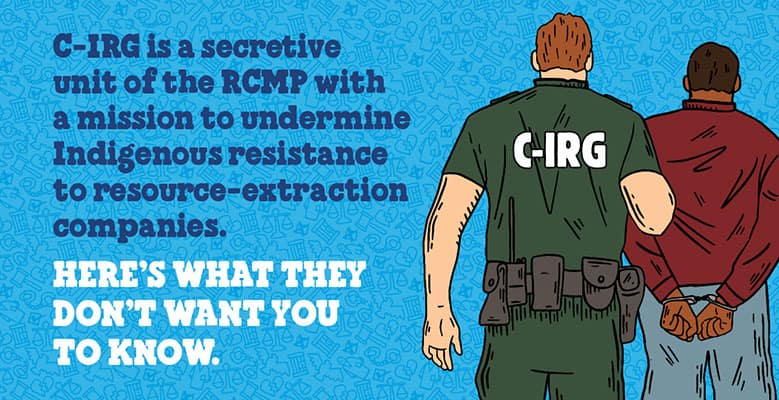
The Community-Industry Response Group (C-IRG) is a lesser-known unit of the Royal Canadian Mounted Police (RCMP) that operates largely in secret, brutally silencing Indigenous land defenders in British Columbia on behalf of big resource-extraction companies.
It was initially formed in 2017 in BC to protect the Trans Mountain Expansion (TMX) and Coastal GasLink (CGL) pipeline projects from Indigenous resistance.
Since then, C-IRG has expanded throughout British Columbia, but its mission remains the same: Violently suppress Indigenous resistance, arrest anyone who impedes resource extraction, evict Indigenous people from their own land, and clear the way for corporate profits.
Silencing Free Speech
Mining, drilling, and logging companies, abetted by the government, have long targeted and exploited Indigenous lands, waters, and resources. Indigenous land defenders have understandably resisted that exploitation—through legal challenges and through protest and activism, often putting their bodies on the line to protect the places they’ve called home for thousands of years.
For resource-extraction companies, Indigenous efforts to assert their rights, access their land, and maintain their cultural practices are little more than an annoying complication that gets in the way of what they’re after: Money, and lots of it. The creation of C-IRG is evidence that the government agrees.
When land defenders recently tried to stop loggers from destroying hundreds of acres of old-growth, 2,000-year-old trees in Fairy Creek, Vancouver Island, C-IRG made nearly 1,200 arrests over an eight-month period, turning Fairy Creek into the largest act of civil disobedience in Canadian history. (Almost all of the charges were later dropped or dismissed.) Despite the repeated violation of their rights, Indigenous protesters continue working to protect their land.
Evidence of Shocking Abuse and Violence
Fairy Creek is just one example of the lengths to which C-IRG will go to silence land defenders and do the bidding of resource-extraction companies.
In fact, an APTN News investigation in June 2022 uncovered nearly 500 allegations against C-IRG that include “intimidation, torture, brutality, harassment, racism, theft, destruction of property, arbitrary detention, inhumanity, lying, and deceit.”
The federal Civilian Review and Complaints Commission (CRCC) is currently conducting a “systemic investigation” of C-IRG. That’s good news, but C-IRG will be allowed to keep brutalizing land defenders while the review proceeds—which could take years to complete. There are already reports that the investigation has been delayed due to the RCMP dragging its feet in handing over requested documents.
Violations of Indigenous Rights and Sovereignty
The larger question, one that many elected officials have not answered, is why these logging, mining, and drilling projects are allowed to proceed without the consent of Indigenous communities. And beyond that, why is C-IRG allowed to enter Indigenous territory, brutalize Indigenous people, and forcibly remove them from their land?
Indigenous rights are supposed to be protected under UNDRIP (the United Nations Declaration on the Rights of Indigenous Peoples) and British Columbia’s Declaration on the Rights of Indigenous People Act. In fact, in northern BC, where C-IRG has been very active, C-IRG is actually allowing industry to break Supreme Court decisions that give authority to Indigenous leadership.
Indigenous communities in BC have made it clear for many years that companies cannot violate their sovereignty by extracting resources on their lands without consent. C-IRG’s suppression of peaceful protests is a clear violation of both international and domestic law.
Where’s the Accountability?
There are no limits on C-IRG’s operating budget, size, or jurisdiction. It’s not even certain how many people work for the unit. C-IRG officers routinely cover their faces and badges in public.
It’s estimated that the government has spent at least $86 million on C-IRG since its creation, but there’s been a lot of secrecy over its budget. Millions of dollars in taxpayer money vaguely marked for “rural policing,” for example, are flowing to C-IRG.
Is This What Reconciliation Looks Like?
The government has pledged to work on repairing relations with Indigenous communities. Officials like to boast about the progress they’ve made on responding to the Truth and Reconciliation Commission’s 94 Calls to Action.
Here’s our question: Is giving C-IRG, a secretive unit of the national police, free rein to violently silence peaceful protests and kick Indigenous people off their own land really an example of reconciliation?
Disband C-IRG!
C-IRG is violating the rights of Indigenous people and it should under no circumstances be allowed to operate while its inhumane tactics are being investigated.
Stop the violence against Indigenous land defenders immediately. Sign this petition and tell your elected officials to disband C-IRG today.


